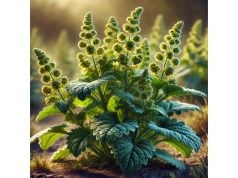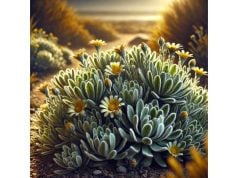
Daisy (Bellis perennis), often called common daisy or English daisy, is best known as a lawn flower, but it also has a long history in traditional European folk use for bruises, minor wounds, and soothing skin preparations. Today, it appears in herbal extracts, cosmetic formulas, and some specialty teas, with growing interest in its phenolic compounds, flavonoids, and triterpene saponins. These compounds help explain why daisy is studied for antioxidant, anti-inflammatory, and skin-support effects.
That said, daisy is not a mainstream medicinal herb with a well-established human dosing standard. Most evidence comes from laboratory and animal research, not large clinical trials. This makes it a plant worth understanding carefully: promising for topical and cosmetic use, interesting for its chemistry, but not something to treat casually as a daily supplement without a plan. This guide covers what it contains, how it is used, how much is reasonable, and where the safety limits matter most.
Essential Insights
- Daisy flower extracts show antioxidant and anti-inflammatory activity, with the strongest support in lab studies and skin-focused applications.
- Topical use is the most practical route for most people, especially in creams or cosmetic extracts aimed at soothing and photoprotection support.
- There is no well-established standard oral human dose, and research dosing often uses non-human models such as 0.01% to 1% topical extract or animal-only ranges.
- Avoid use during pregnancy or breastfeeding, and avoid if you have Asteraceae family sensitivity or a history of contact dermatitis from daisy-family plants.
Table of Contents
- What is Daisy and what does it contain
- Which Daisy benefits are most plausible
- Does Daisy help skin and wounds
- How to use Daisy in practice
- How much Daisy and when
- Daisy side effects and who should avoid it
- What research on Daisy actually shows
What is Daisy and what does it contain
Daisy (Bellis perennis) is a low-growing flowering plant in the Asteraceae family, the same broad family that includes chamomile, calendula, and many other medicinal and ornamental species. It is native to Europe and now widely naturalized. In herbal and cosmetic contexts, the flower is usually the main part used, though some traditions also mention aerial parts (the above-ground plant).
What makes daisy interesting is not one “magic” ingredient, but a layered profile of plant compounds that likely work together. The most discussed groups include:
- Phenolic compounds (such as phenolic acids), often linked to antioxidant activity.
- Flavonoids, including compounds related to apigenin and other common plant antioxidants.
- Triterpene saponins, a major hallmark of Bellis perennis chemistry and one of the reasons the plant gets pharmacology attention.
- Fatty acids and other minor phytochemicals, which may contribute to broader biological effects.
In practical terms, these compounds help explain why daisy extracts are studied for oxidative stress, inflammatory pathways, and skin-related effects. They also explain why extraction method matters so much. A water infusion, an alcohol tincture, and a cosmetic extract will not contain the same balance of molecules.
One useful detail for readers comparing products: daisy extracts are often sold under names such as Bellis perennis flower extract, common daisy extract, or English daisy extract. In cosmetic products, it is sometimes marketed for brightening or skin tone support. In herbal products, it may appear in blends for skin comfort, minor bruising support, or seasonal wellness.
Because daisy is also an ornamental and occasionally edible flower, people sometimes assume it is automatically gentle. That is not always true. Botanical identity, dose, preparation type, and personal sensitivity all matter. Some plant databases also flag daisy for possible toxicity or skin reactions in certain people, which is why the “natural equals safe” shortcut is a mistake here.
A final point that helps avoid confusion: homeopathic Bellis perennis and herbal Bellis perennis extract are not the same thing. Homeopathic products use a completely different preparation and dosing logic. If you are reading labels or searching online, make sure you know which one you are buying.
Which Daisy benefits are most plausible
If you look at daisy’s traditional uses and modern lab findings side by side, a pattern appears: the most plausible benefits cluster around skin support, antioxidant effects, and mild anti-inflammatory activity. Other claimed uses, such as metabolic support or mood effects, are interesting but still early-stage.
Here is the most balanced way to think about daisy benefits.
1) Antioxidant support is the strongest chemistry-based claim
Daisy flower extracts consistently show antioxidant activity in laboratory testing. This does not mean a daisy tea will work like a medicine in humans, but it does show the plant contains compounds that can neutralize free radicals and support antioxidant assays. This is one reason daisy appears in both herbal and cosmetic formulas.
The antioxidant angle is also one of the better-supported links between traditional use and modern testing. Plants used for bruises, skin irritation, or recovery often show antioxidant and anti-inflammatory signatures in the lab, and daisy fits that pattern.
2) Anti-inflammatory effects are plausible, especially in extracts
Several daisy studies and reviews describe anti-inflammatory activity in cell-based systems and extract testing. The exact strength depends on the extraction method and the compounds concentrated. In practical terms, this is why daisy is more often discussed for:
- skin-calming products,
- topical comfort blends,
- and targeted extracts rather than general wellness teas.
It is also why product quality matters. Two “daisy extracts” can differ widely if one is standardized for phenolics and another is simply a dilute flower infusion.
3) Skin and wound support is a traditional use with some preclinical backing
Daisy has a longstanding folk reputation for helping with bruises and minor wounds. Modern studies do not yet prove a clinical treatment effect in humans, but animal and skin-cell data make this traditional use more credible than many vague online claims.
4) Metabolic and glucose-related claims are promising but preliminary
Some daisy compounds, especially triterpene-rich fractions, have been explored in models related to lipid and glucose pathways. These findings are scientifically interesting, but they are not enough to position daisy as a diabetes or cholesterol treatment.
For most readers, the practical takeaway is simple:
- Most credible uses: skin-focused and topical support, especially in well-made extracts.
- Possible but unproven uses: metabolic support, mood-related effects, and broader internal health claims.
- Not established: daisy as a substitute for standard medical care.
That distinction matters, especially because daisy’s reputation online sometimes gets inflated. A good herb guide does not just list benefits; it separates likely, possible, and not yet proven. Daisy is a good example of why that distinction is so important.
Does Daisy help skin and wounds
This is the question most readers actually care about, and it is where daisy has the clearest traditional-to-modern bridge.
Historically, Bellis perennis was used in Europe for bruises, wounds, and tissue recovery. Modern research has not yet produced large human clinical trials, but there are two kinds of evidence that make the skin-use case more credible than many herbal claims:
- animal wound-healing research, and
- cell-based photoprotection research.
In wound-focused animal models, daisy flower fractions applied topically showed improved wound closure outcomes compared with controls. That does not prove the same effect in humans, but it does support why the plant stayed in traditional topical practice for so long.
More recently, daisy extract has also been studied in keratinocyte (skin cell) models exposed to UVA stress. In those lab settings, Bellis perennis extract helped improve markers related to cell survival, oxidative stress, and inflammatory signaling. That is a meaningful finding for cosmetic science because it supports daisy’s role as a supportive skin ingredient, especially in products aimed at environmental stress and recovery.
This is where many commercial claims come from, but it is worth translating the science into plain language:
- Daisy is not sunscreen.
- Daisy does not replace sun protection.
- Daisy may be a supportive ingredient in formulas designed for skin defense and recovery.
For people deciding whether to try a daisy product for skin, the most realistic benefits are:
- mild soothing support,
- antioxidant support,
- and inclusion in multi-ingredient recovery formulas.
If you are comparing daisy with better-known skin herbs, it helps to think of it this way:
- Calendula is more established for general skin comfort and barrier support.
- Arnica is more commonly used for bruising and soreness (with important safety limits).
- Daisy sits in a middle lane: less famous, but chemically interesting and increasingly used in cosmetic extracts.
The quality question is critical. A product that simply says “daisy” may not tell you whether it uses flowers, whole plant, or a standardized extract. The best labels usually specify:
- Bellis perennis flower extract
- extraction medium (water, glycerin, alcohol, etc.)
- concentration or percent in formula
- intended use (cosmetic vs herbal)
If you want daisy for skin support, topical use is the most evidence-aligned option. It is also the route with the lowest systemic exposure, which is often the safer starting point for herbs that have limited human dosing data.
How to use Daisy in practice
Daisy can be used in a few different ways, but the best choice depends on your goal. Most people do best with a topical product rather than oral use, especially because oral dosing is not standardized.
Here are the main forms you may see and how they are typically used.
Topical cosmetic or herbal products
This is the most practical route for daisy.
Common options include:
- creams
- gels
- serums
- spot treatments
- balm blends
- botanical extracts added to lotions
These are usually marketed for skin tone support, soothing, or recovery. If the product is a cosmetic, follow the label directions and start once daily to see how your skin reacts.
Compresses and traditional external use
Some traditional users prepare a daisy infusion and use it externally as a cool compress. If you do this, hygiene matters:
- Use clean plant material from a trusted source.
- Prepare with clean water.
- Let it cool fully.
- Use a clean cloth.
- Discard leftovers quickly rather than storing for days.
This method is simple, but it is also less standardized than a commercial extract.
Tea or culinary use
Daisy flowers and young leaves are sometimes used in small amounts in salads, teas, or soups. This is usually described as occasional culinary use, not a therapeutic dose. The key issue is that edibility does not remove all risk. Some people react to daisy-family plants, and plant age, preparation, and individual sensitivity can change tolerance.
Homeopathic products
You may also find Bellis perennis in homeopathic preparations. These are common in some regions, but they are not the same as herbal extracts. If a label says homeopathic potency, do not try to convert it into herbal mg dosing.
Practical selection tips
When buying a daisy product, look for:
- the full botanical name Bellis perennis
- the plant part used (ideally flower)
- intended route (topical or oral)
- concentration or extract ratio if listed
- clear instructions and warnings
Avoid vague products that only say “daisy extract” without any details.
A smart starting strategy is to choose one use case first. For example, try a topical daisy product for skin support for 2 to 4 weeks, rather than taking multiple daisy products at the same time. This makes it much easier to judge whether it helps and whether you tolerate it.
How much Daisy and when
This is the hardest section in any daisy guide, because there is no widely accepted standard oral human dose for Bellis perennis flower extract. That is the most important dosage fact to understand up front.
Most published daisy data comes from:
- in vitro (cell) studies,
- animal studies,
- extraction optimization studies,
- and traditional use records.
Those do not translate cleanly into a safe daily self-dose for everyone.
The safest dosing approach for most people
If you are using daisy as a consumer product, the best rule is:
- Use the product exactly as labeled
- Start low and slow
- Use one product at a time
- Track your response for 1 to 2 weeks
This is especially true for oral products, where the extract strength can vary significantly.
What research dosing looks like
Research doses are useful for context, but they are not self-treatment instructions.
Examples include:
- Skin-cell studies using Bellis perennis extract concentrations such as 0.01% to 1% in laboratory media.
- Topical animal studies where a daisy fraction was delivered in an ointment and applied once daily for 30 days.
- Extract studies that report antioxidant and anti-inflammatory activity as lab values, not as a human capsule dose.
These numbers help you interpret claims, but they do not create a universal “take this much” recommendation.
Timing and duration
For topical use, a practical schedule is:
- Once daily for 3 to 7 days as a patch-tested trial, then
- 1 to 2 times daily if tolerated and if the product label supports it.
For oral or tea use, there is no strong evidence-based timing (morning vs night) that applies to everyone. If someone chooses culinary or tea use, it should be:
- occasional,
- modest in quantity,
- and stopped immediately if symptoms appear.
A useful quality clue for extract potency
Some research on daisy flower extraction reports detailed extraction conditions and phenolic yields, which shows how much potency can change depending on preparation. That is one reason “daisy tea” and “daisy extract” should never be assumed to be equivalent.
Bottom line on dosage
- No standardized human oral dose exists
- Topical use is easier to dose safely
- Research doses are not consumer doses
- Pregnant or breastfeeding individuals should not self-dose daisy products
If you want a more structured plan, a pharmacist, physician, or qualified clinical herbal professional can help you choose a product and monitor tolerance, especially if you take prescription medicines.
Daisy side effects and who should avoid it
Daisy often looks harmless, but safety matters here. Bellis perennis can be tolerated by some people in small culinary or topical amounts, yet it can also cause problems depending on sensitivity, dose, and product type.
Common and possible side effects
Reported or practical concerns include:
- Stomach upset (such as nausea, vomiting, diarrhea, or constipation), especially if ingested
- Lethargy or feeling unwell after ingestion in sensitive individuals
- Contact dermatitis (skin irritation or rash), especially with topical use
- Allergic reactions in people sensitive to Asteraceae family plants
Many plant references also note that toxicity risk can vary with:
- plant part used,
- how much is taken,
- whether it is raw or cooked,
- and the person’s age or sensitivity.
That is exactly why “just a flower” is not a good safety standard.
Who should avoid daisy
The following groups should generally avoid self-using daisy medicinally unless a clinician advises otherwise:
- Pregnant or breastfeeding people
- Safety data is limited, and some plant references specifically advise against use.
- People with daisy-family allergies
- If you react to chamomile, ragweed, chrysanthemums, calendula, or other Asteraceae plants, use extra caution or avoid daisy entirely.
- People with sensitive skin or a history of contact dermatitis
- Daisy may be more likely to cause a reaction when applied topically, especially in concentrated extracts.
- Children and pets
- Accidental ingestion risk is a concern, and dose tolerance is harder to predict.
- People on multiple medications
- There is not enough interaction research to safely assume no interactions.
Interaction considerations
Formal interaction data for daisy is limited, but sensible caution applies. Because daisy has preclinical activity in inflammatory and metabolic pathways, talk with a clinician before use if you take:
- glucose-lowering medications,
- sedating medications,
- or medicines for chronic inflammatory conditions.
Even if a direct interaction has not been proven, low-data herbs should be handled conservatively.
Patch testing for topical use
If you use a daisy cream, balm, or extract:
- Apply a small amount to the inner forearm.
- Wait 24 hours.
- Check for redness, itching, or burning.
- Stop if irritation appears.
This one step prevents many avoidable reactions.
The strongest safety mindset for daisy is simple: treat it like a real bioactive plant, not just a decorative flower. That means lower starting exposure, better labels, and faster stopping if symptoms appear.
What research on Daisy actually shows
Daisy research is more interesting than most people expect, but it is also easy to overread. The evidence base is broad in chemistry and preclinical work, yet still thin in human clinical trials. That balance is the key to using the plant wisely.
What the evidence supports reasonably well
1) Daisy has real bioactive chemistry
This is not speculative. Bellis perennis flowers contain measurable phenolics, flavonoids, and triterpene saponins, and modern extraction studies show these can be enriched depending on method.
2) Extract quality changes results
Research on extraction conditions shows that solvent strength, extraction time, and process details can substantially alter phenolic yield and antioxidant output. This explains why one daisy product may feel active and another may feel weak.
3) Preclinical antioxidant and anti-inflammatory activity is consistent
Across lab assays and experimental systems, daisy repeatedly shows signals that fit its traditional use and modern cosmetic interest.
4) Skin-focused applications have the clearest practical path
The skin-cell and wound-model data do not prove clinical efficacy, but they do provide a coherent rationale for topical daisy formulations.
What the evidence does not prove yet
- It does not prove daisy treats chronic disease in humans.
- It does not establish a standard oral dose.
- It does not confirm long-term safety for daily internal use.
- It does not justify replacing standard treatment for wounds, inflammation, or skin disease.
How to interpret online claims
A good rule is to rank claims by evidence level:
- Most reliable: “Daisy contains active compounds and shows antioxidant and anti-inflammatory effects in preclinical studies.”
- Reasonable with caution: “Daisy may support skin recovery and cosmetic photoprotection strategies.”
- Too strong for current evidence: “Daisy cures skin disease” or “Daisy is a proven oral anti-inflammatory remedy.”
Best use case for most readers
If someone wants to try daisy, the evidence suggests the most sensible path is:
- Choose a reputable topical product using Bellis perennis flower extract
- Patch test first
- Use it consistently for a short trial period
- Watch for irritation
- Avoid internal dosing unless you have a specific product and professional guidance
That approach respects both the promise and the limits of the plant.
Daisy is a good example of a botanical that sits between traditional herbalism and modern cosmetic science. It has enough chemistry and early research to deserve attention, but not enough human data to justify casual, high-dose self-experimentation. Used carefully, it can be a useful ingredient. Used carelessly, it can still cause problems.
References
- (Bio)active Compounds in Daisy Flower (Bellis perennis) – PMC 2023 (Review)
- Optimization of phenolic compounds extraction from Bellis perennis flowers and assessment for antioxidant properties | The Annals of the University Dunarea de Jos of Galati. Fascicle VI – Food Technology 2022 (Original Research)
- Bellis perennis extract mitigates UVA-induced keratinocyte damage: Photoprotective and immunomodulatory effects – PubMed 2021 (In Vitro Study)
- The evaluation of topical administration of Bellis perennis fraction on circular excision wound healing in Wistar albino rats – PubMed 2012 (Animal Study)
- Bellis perennis (Bairnwort, Banwood, Banwort, Bone Flower, Bonewort, Bruisewort, Common Gowan, Dog Daisy, Double Daisy, English Daisy, Goose Flower, Herb Margaret, Lawn Daisy, Marguerite, May Gowan, Noon Flower, True Daisy, Woundwort) | North Carolina Extension Gardener Plant Toolbox n.d. (Extension Monograph)
Disclaimer
This article is for educational purposes only and is not medical advice. Daisy (Bellis perennis) products are not a substitute for diagnosis, prescription treatment, or emergency care. Human research on medicinal dosing and long-term safety is limited, especially for internal use. If you are pregnant, breastfeeding, managing a chronic condition, taking medications, or have a history of plant allergies or contact dermatitis, speak with a qualified healthcare professional before using daisy medicinally or topically.
If you found this guide useful, please consider sharing it on Facebook, X (formerly Twitter), or any platform you prefer.






